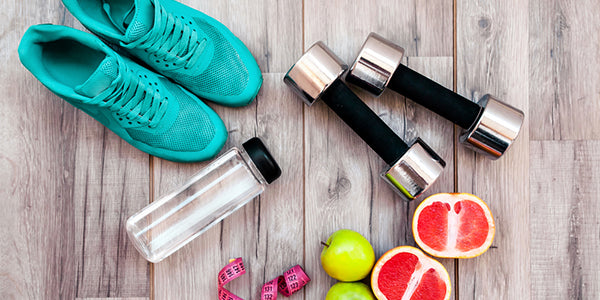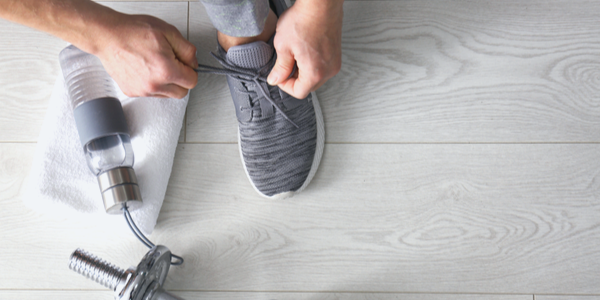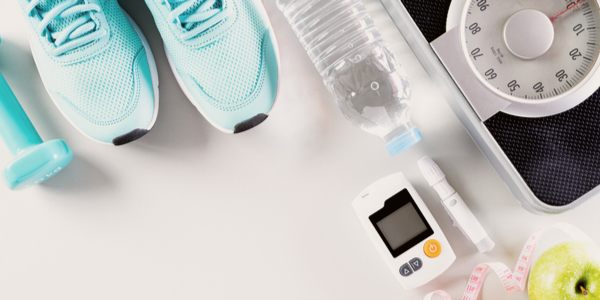
Social media outlets and information right at people's fingertips is generating self-proclaimed "health experts."
And though some of the information may be noteworthy, false claims can still flood search engines. What's more, the fitness truths and facts become blanketed by fallacies.
Do not let fitness myths cover up quality fitness advice!
The Fitness Advice You Shouldn't Take
Whether related to exercise or diet, do not be tricked into believing these false fitness tips.
1. Lifting weights will bulk you up.
Generally, females leave it to the males to flood the weight room. They tend to shy away from lifting weights in fear of getting "too bulky."
However, females can also truly benefit from strength training for lean muscle growth. Increased muscle mass also raises metabolism, thus burning more calories even at rest.
So ladies, do not let weights be intimidating during your next gym trip!
2. A very high protein diet is needed for muscle growth.
False. People often think high protein intake is essential for muscle growth. Though protein certainly is needed for muscle repair and synthesis, slamming down protein shakes and steaks is not needed following workouts.
The best post-workout meal includes carbohydrate for energy repletion and protein for muscle recovery. Fruit and plain Greek yogurt, cottage cheese, peanut butter, and chocolate milk are a few post-workout examples.
3. You need to "reset" and "reboot" with a cleanse.
Cleanses and detoxes are promoted as an essential "reset" button and will "rid your body of toxins." These sort of products generally come with hefty price tags without being beneficial and holding up to their proclaimed promises.
A healthy individual already has free detox equipment, also known as the liver and kidneys, and work efficiently to excrete waste. Generally, these detox products are manufactured from spices, herbs, fruit juices, and vegetable juices.
So instead of spending money on pricey cleanses, go for a bag of fresh produce loaded with nutrients and fiber.
4. Everyone can benefit from carb-loading.
Carb-loading is a common practice in the exercise world and used to prevent muscle glycogen depletion during workouts. When carb-loading, athletes increase carb intake and taper off training, specifically leading up to race day.
However, carb-loading is generally only effective if an endurance athlete participates in over 90 minutes of activity. Marathoners and cyclists would benefit from carb-loading much more than a runner racing in a 5K.
5. Running is the best exercise for weight loss.
Okay, running can certainly lead to weight loss. However, exercising and weight loss are not a "one size fits all." Not all shoes are running shoes and not all people are runners.
Any sort of consistent cardio can torch calories. So if running seems more daunting than fulfilling, participate in exercises you find more satisfying. There are many forms of cardio to choose from, including biking, swimming, dancing, and any activity that elevates heart rate.
And remember, strength training should also be included to build muscle. The more built, the greater the metabolic burn even the body is at rest. This helps lead to lasting weight loss.
6. If there is no pain, there is no gain.
While an effective workout may cause mild soreness and fatigue, you should not feel totally crippled. Not having intense muscle pain does not reflect a poor or ineffective workout.
As a general guideline, soreness starts the next day and lasts up to three days. Going beyond three days with the same intense pain often indicates you have overdone it or provoked an injury.
7. You must take supplements for best results.
Never believe there is a magic pill for weight loss and results. Avoid buying into pills, herbs, drinks, and other promotions for quick weight loss or muscle growth.
Though some supplements may be effective, it is important to realize they are supplementing a healthy lifestyle. And ultimately, supplements should not replace nutritious foods and exercise.
8. Fat loss can be targeted.
Some exercises are promoted to target belly fat and other specific body areas. However, single movements cannot rid fat in certain, primary regions.
Instead of believing excess crunches can rid fat in the midsection, understand the most effective means to do so. This often includes a combination of consistent cardio, resistance training, and a well-balanced diet.
The Fitness Advice You Should Take
With so many fitness tips out there, how do you know which advice to take?
First and foremost, seek medical advice before gearing into any new fitness or weight loss journey. This serves true especially if managing a health condition such as diabetes.
Most factual information has reputable names and credentials that stand behind it. Take fitness advice from health professionals and experts, as they have undergone specialized schooling and training to relay honest knowledge. Registered Dietitians and personal trainers are a couple beneficial resources.
When searching for advice via web searches, even if claims seem convincing, confirm sources and organizations providing the information. And if the advice seems too good to be true, it more than likely is!
Truly, long-term weight loss and staying fit comes with making a total lifestyle change. This includes factors related to diet, exercise, sleep, and stress.
Diet
A good diet not only helps with weight loss but nourishes the body for proper recovery post-exercise.
Aim to eat more wholesome foods, including whole grains, fresh produce, lean proteins, and healthy fat sources. Limit the intake of "junk food," or overly processed products rich in added sugar, salt, oil, and calories.
Other healthy eating tips include practicing portion control and mindful eating. Set a goal to drink more water, too, or at least 64 ounces daily.
Exercise
The most importance of fitness is dismissing a sedentary lifestyle and increasing physical activity. However, a mix of different exercises can take fitness goals to the next level.
As a general rule, aim for at least 150 minutes of cardio weekly. Include strength training two to three times a week, too. Focus on targeting all major muscle groups, including of the back, chest, shoulders, arms, and legs.
A high-intensity workout is also helpful in losing weight, especially on a time crunch. High-intensity interval training (HIIT) involves intense bouts of movements that elevate heart rate and stimulate muscles for a short duration. (Even as quick at 10 to 20 minutes!)
Sleep
Sleep is important for both mental and physical health.
Besides, sleep deprivation can plummet energy levels to tackle a workout. It can heighten cravings towards innutritious foods, too.
The National Sleep Foundation recommends seven to nine hours of sleep each night. To achieve adequate sleep, stay consistent with sleep and wake cycles and limit caffeine. Regular exercise can also improve sleep.
Stress
Like inadequate sleep, chronic stress can harm mental and physical health. Stress can further lead to weight gain, particularly related to bouts of emotional eating and heightened cortisol levels.
While eating can suppress undesirable emotions, the foods sought tend to be rich in calories from sugar and fat. and lead to weight gain.To make matters worse, the body releases the hormone cortisol in times of stress. The hormone is known to heighten cravings, store fuel and energy as fat, and slow down the metabolism.
So rather than negatively feeding into or avoiding stress, learn to manage it with positive coping strategies. This can include exercising, meditating, deep breathing, and calling a family member.







